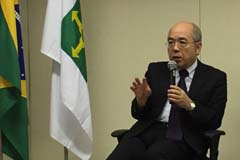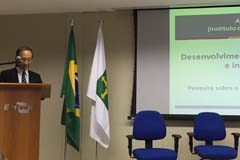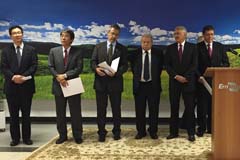Discussing "the Miracle of the Cerrado" -- Seminars Commemorating Publication Held in Brasilia and Sao Paulo
2016.03.18
Brazil, one of the world's major grain producers today used to import grain. It is only in 2011 that it became the world's largest exporter of soybeans. The situation changed dramatically when the barren expanse of the "Cerrado" tropical savanna region was transformed into one of the world's most productive agricultural areas due to the large-scale agricultural development started in the 1970s. This so-called "miracle of the Cerrado" realized rain-fed grain farming in a tropical region for the first time in human history.
The book "Development for Sustainable Agriculture: The Brazilian Cerrado" describing the history and contributing factors of this miracle was published by Palgrave Macmillan in October 2015. Seminars commemorating the publication were held jointly with the Brazilian Agricultural Research Corporation (EMBRAPA) in Brasilia on March 3, 2016 and with the JICA Alumni Association of Sao Paulo (ABJICA) in Sao Paulo on March 4, 2016. The editors of the book, JICA-RI Senior Research Advisor Akio Hosono, former President of EMBRAPA Carlos Magno Campos da Rocha, and former JICA Visiting Senior Advisor Yutaka Hongo gave presentations.

Former JICA Visiting Senior Advisor Yutaka Hongo
Hongo is one of the important figures who contributed to the Cerrado development from the 1970s. He provided an overview of the achievements made in a long history of Cerrado agriculture. He pointed out three contributing factors to success in Cerrado: (1) the development of agricultural technology through research cooperation between Japan and Brazil from the initial stages of development, (2) coordination of the entire project by CAMPO, which was established by the two countries, and (3) adequate financing cooperation for development. He explained 350,000 hectares were developed in 21 project sites during the period from 1979 until 2001. As a result, 20,000 jobs were created, and annual grain production reached 650,000 tons with annual sales of USD 160 million. Such results spilled over to the surrounding regions, increasing agricultural production.
The achievements of the Cerrado development were described by the British publication "The Economist" (August 28, 2010 issue) as "the Miracle of the Cerrado." In addition, Norman E. Borlaug - who received the Nobel Peace Prize for leading the green revolution and established the World Food Prize - praised it as "one of the great achievements of agricultural science in the 20th century."
Another editor, Hosono, talked about the role and impact of the Cerrado development in a presentation on "The Cerrado Agricultural Development and Social Inclusion." He pointed out the Cerrado agricultural development contributed to raising income and creating jobs in the region, and also boosted economic growth and brought about an influx of population from other regions. An extensive agro-industry value chain, which has developed in Cerrado, contributed to creating job opportunities and the advancement of a variety of industries, he said.

JICA-RI Senior Research Advisor Akio Hosono
Sustainable Development Goals (SDGs) were adopted at the United Nations summit in September 2015, based on the results of the United Nations Conference on Sustainable Development (Rio+20) held in Rio de Janeiro in June 2012. From this context, Hosono indicated the Cerrado agricultural development not only contributed to the world's food security and inclusive and sustainable regional development, but is also being focused upon as agriculture with emphasis on the ecosystem and conservation of the environment.
The other editor at the seminar was former EMBRAPA President Carlos Magno Campos da Rocha, who led the Cerrado development. He talked about the history and challenges of the EMBRAPA, and the possibility of applying experiences to tropical savanna regions with similar climates and soil.
Former Minister of Agriculture Alysson Paulinelli, who led the Cerrado development in the 1970s and penned the foreword of the book, made a keynote speech in Brazillia. Presentations were also made by former EMBRAPA President Eliseu Alves, CAMPO President Emiliano Pereira Botelho, and Edson Eyji Sano of the Brazilian Institute of Environment and Renewable Natural Resources (IBAMA).
In both seminars, representatives of the Brazilian federal government and those from the private sector and researchers participated and exchanged opinions with those in attendance.
Hosono said, "It was a seminar with great historical significance and fruitful discussion. It brought together everyone involved in driving the Cerrado development in Brazil, which has come to play a significant role as the world's food basket."

The books were handed to the involved parties.

事業事前評価表(地球規模課題対応国際科学技術協力(SATREPS)).国際協力機構 地球環境部 . 防災第一チーム. 1.案件名.国 名: フィリピン共和国.

事業事前評価表(地球規模課題対応国際科学技術協力(SATREPS)).国際協力機構 地球環境部 . 防災第一チーム. 1.案件名.国 名: フィリピン共和国.

事業事前評価表(地球規模課題対応国際科学技術協力(SATREPS)).国際協力機構 地球環境部 . 防災第一チーム. 1.案件名.国 名: フィリピン共和国.

事業事前評価表(地球規模課題対応国際科学技術協力(SATREPS)).国際協力機構 地球環境部 . 防災第一チーム. 1.案件名.国 名: フィリピン共和国.

事業事前評価表(地球規模課題対応国際科学技術協力(SATREPS)).国際協力機構 地球環境部 . 防災第一チーム. 1.案件名.国 名: フィリピン共和国.
scroll